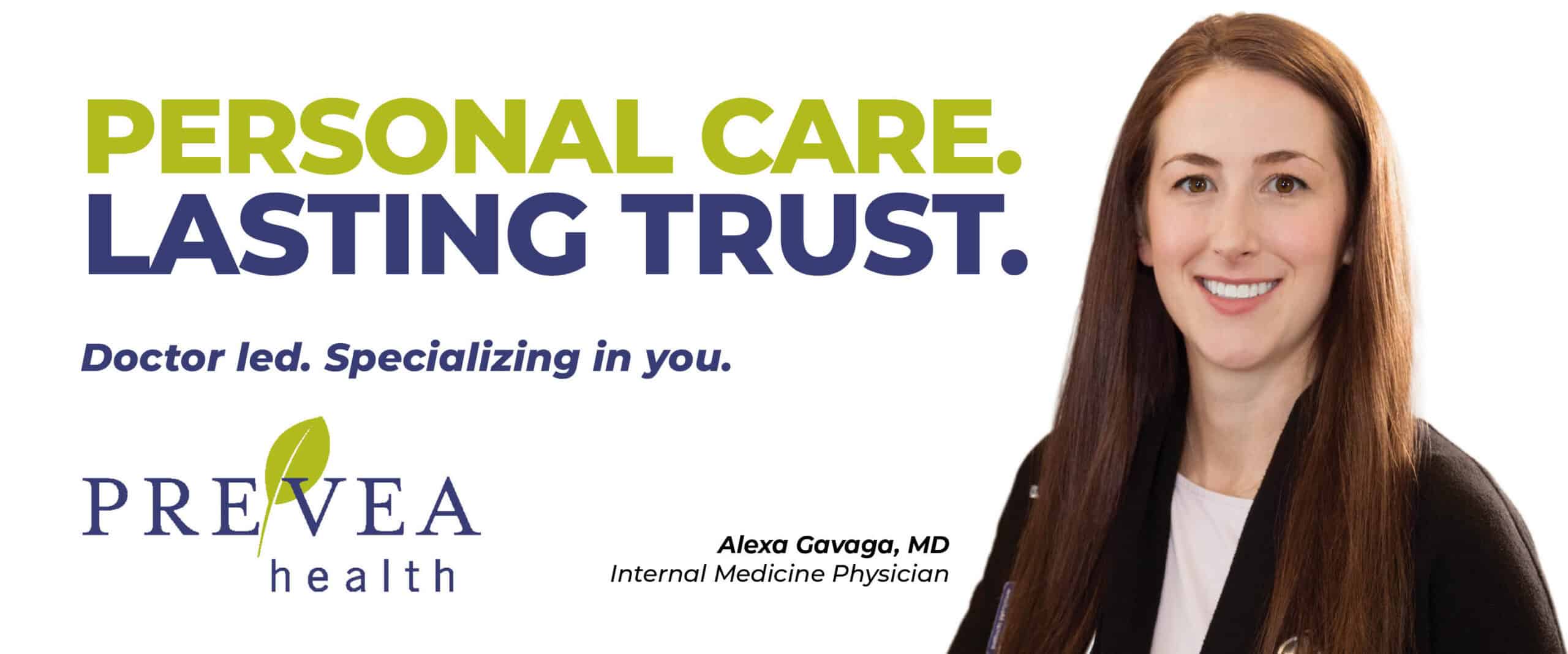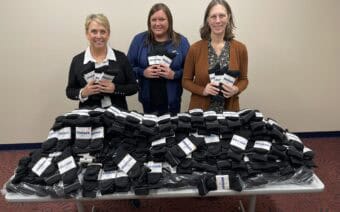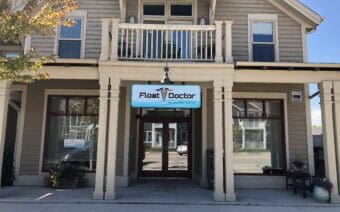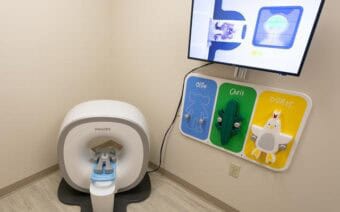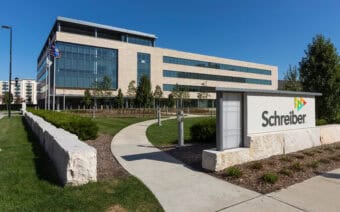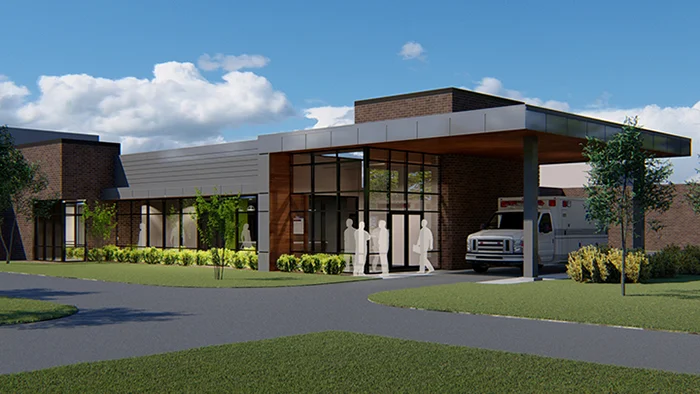
June 1, 2023
CLEVELAND – As the demand continues to grow among area hospitals and clinics for trained healthcare professionals, Lakeshore Technical College (LTC) is doing what it can to help bridge the gap.
In an effort to accomplish those goals, the college is constructing a $5 million, 17,000-square-foot health skills and education center – the Center for Health Care Excellence – aimed at supporting the training of 1,500 students annually, nearly doubling what the current facility can support.
“We are the only program in Sheboygan and Manitowoc counties that does all the levels of the professional training,” Kristy Liphart, vice president of advancement at LTC, said.
The project, which was kicked off with a ceremonial groundbreaking late last month, has an anticipated completion date of fall 2024.
Liphart said the demand the area is seeing in the fields of nursing, medical assistant, ophthalmic assistant, radiography and emergency services, are all fields of study LTC offers, and the addition will help further support.
“We do great things because we fundamentally believe the students who we teach and support deserve nothing less,” Lakeshore President Dr. Paul Carlsen said. “This new Center for Health Care Excellence is a great thing. We thank our community for supporting us and pushing us to do great things.”
According to Carlsen, more than 75% of the college’s healthcare graduates stay in the community and work at local healthcare facilities.
“We want to train our students who are from the region for our local workforce,” Liphart said. “The need is very high. There are vacancies everywhere. Many of our students are hired before they graduate.”
Multi-year effort
Liphart said the plan for an updated facility for healthcare-related studies at LTC has been discussed for many years.
“We have a facility’s master plan,” she said. “So, five years out, we are planning what areas of the campus need to be improved. So, we’re doing continual improvement.”
Originally, Liphart said the project started as a refresher for the health skills lab, which is normally done using existing funds the college saves or leverages with the state.
“We do it in all the different areas of the college,” she said.
However, because the health labs are expensive due to the type of technology equipment needed, Liphart said the project also required a refresh of the physical space.
//17bec5072710cda5b8dd81b69f4c6e58.cdn.bubble.io/f1685643215144x804614878115872900/richtext_content.webpKristy Liphart
Then the COVID-19 pandemic happened, and Liphart said the workforce needs in the healthcare industry increased exponentially.
“We realized that not only do we need to refresh the lab, but we needed to attract more students to the program,” she said. “That’s where the project blossomed.”
Liphart said from there, the project got larger by looking at capacity – not just in terms of students but its offering capabilities.
“One of the unique things about clinicals is that our nursing students take the same board certifications all nurses do across the country,” she said. “And nursing board examiners said if we had the right equipment and facilities, our nursing students could get 50% of their clinical hours, toward their degree in a simulation lab.”
Liphart said LTC has some simulation labs, but they have been retrofitted to the current space.
“(The project is) adding five simulation labs so we can move students through their clinicals faster and also then bring in more students,” she said.
Liphart said the simulation labs provide students with “real-life” experiences.
“We have a certified simulation instructor who runs students through protocols for a heart attack, pediatric emergencies, etc.,” she said. “We use mannequins that are highly sophisticated that stop breathing, they throw up, they have babies. The simulation instructor can make these mannequins do any number of things with the students in these rooms that look like an emergency room or hospital room and as if they were responding to a live patient.”
Liphart said the 17,000-square-foot project includes a nearly 8,000-square-foot addition, and an approximate 9,000-square-foot remodel of the college’s current health skills and education center.
Liphart said classes will be held as usual throughout construction.
“We’re going to set up what we can in existing spaces so no one loses any continuity,” she said.
Liphart said updated facilities, equipment and technology will enable Lakeshore to provide students with the highest quality professional health education quickly and effectively.
“Everyone is excited about the new facility,” she said.
Efficient, affordable option
Liphart said LTC offers students an affordable option to get a degree and enter the job market in an efficient manner.
“We provide the first two years of clinical instruction for $143 a credit – half the price of a (four-year college),” she said. “They are then able to finish their two-year associate’s degree program, get their boards done and work as a registered nurse right away. There’s quite a competitive market and that means they’re earning good wages pretty quickly out of their two-year associate’s degree programs.”
//17bec5072710cda5b8dd81b69f4c6e58.cdn.bubble.io/f1685643246266x145441006052522420/richtext_content.png
Lakeshore Technical College kicked off construction of its 17,000-square-foot health skills and education center with a ceremonial groundbreaking event late last month. Submitted Photo
Liphart said for those who want to continue their education to obtain a bachelor’s degree in nurse management or a master’s degree in nursing to become a nurse practitioner, employers often help financially to support that.
“They could attend the University of Wisconsin-Green Bay, Lakeland University or the University of Wisconsin-Oshkosh,” she said.
Project funding
In terms of funding, Liphart said the $5 million project is a joint venture between LTC and the LTC Foundation, which she is also the executive director of.
“The foundation started the $3 million capital campaign for the project, which started right as the pandemic started in 2020,” she said. “We did the bulk of our fundraising in 2022, and we finished the campaign in the last month.”
Liphart said the LTC Foundation raised $3 million in funds for the overall initiative, with the college contributing the remaining $2 million.
“The foundations (raised the funds) through private fundraising – we didn’t do any federal grants,” she said. “We raised (the money needed) from the local community, which is exciting.”
Liphart said a $1 million donation came in from Froedtert & the Medical College of Wisconsin. “That is our largest gift so far in the foundation’s and college’s history,” she said.
Liphart said the foundation also received $500,000 donations from the West Foundation in Manitowoc and The Bronx Family Foundation in Sheboygan.
“So, we had $2 million toward the $3 million goal within about six months of starting the campaign,” she said.
Another $200,000 donation, Liphart said, was made in support of student scholarships for those enrolled in LTC healthcare programs.
“We are going to continue to grow, so my work isn’t done,” she said. “Even though we’ve achieved our goal (for the project), we’re going to continue to work on developing scholarships. Some of our students are nontraditional, and they’re raising families, or they’re coming back to school – so their needs for financial assistance are high.”
 Unplug, unwind and settle into the simple life
Unplug, unwind and settle into the simple life Wisco Branding: Amplifying voices, connecting with community
Wisco Branding: Amplifying voices, connecting with community

